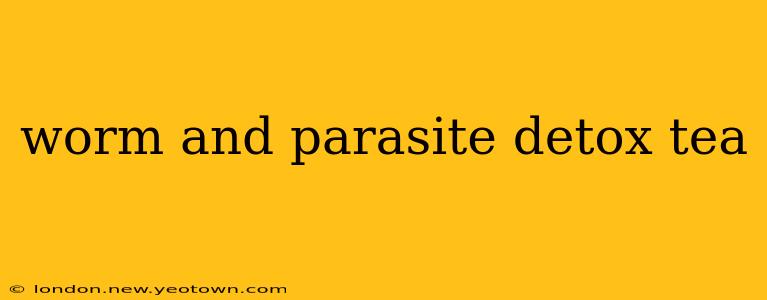Worm and Parasite Detox Tea: Fact vs. Fiction
The idea of a magical "worm and parasite detox tea" promising to cleanse your body of unwelcome guests is alluring. We've all heard whispers about hidden invaders lurking within, causing fatigue, digestive upset, and a whole host of other ailments. But the reality of parasite and worm detoxification is far more nuanced than a simple cup of tea. This journey will unravel the truth behind these claims, exploring what science says about parasites, the potential benefits (and limitations) of herbal teas, and the crucial role of medical advice.
What are internal parasites, and how do they affect the body?
Internal parasites, including worms and protozoa, are organisms that live inside the body and feed off their host. Imagine them as tiny squatters, consuming your resources and potentially causing significant harm. These unwanted guests can manifest in various ways, depending on the type of parasite and the individual's overall health. Some common symptoms include abdominal pain, diarrhea, nausea, weight loss, fatigue, and skin rashes. However, many parasitic infections are asymptomatic, meaning they show no noticeable symptoms.
Can herbal teas help with parasite cleansing?
Certain herbal teas have traditionally been used to support digestive health and may possess some anti-parasitic properties. However, it's crucial to understand that their effectiveness is often limited and anecdotal. While some herbs may contain compounds with potential anti-parasitic activity, scientific evidence supporting their efficacy in treating established parasitic infections is often lacking or inconclusive. Furthermore, the concentration of these active compounds in commercially available teas can be inconsistent and unreliable. Relying solely on herbal teas for parasite removal can be dangerous, potentially delaying proper medical intervention.
Are there specific herbs known for their anti-parasitic properties?
Several herbs have been traditionally used for their purported anti-parasitic properties. These include wormwood, cloves, black walnut, and grapefruit seed extract. It's important to note that while some preliminary research exists on these herbs, more rigorous, large-scale studies are needed to confirm their effectiveness and safety. Furthermore, the concentration of active compounds in these herbs can vary widely, making standardization and dosage challenging.
What are the risks of using detox teas for parasites?
Self-treating parasitic infections with detox teas can be risky. Firstly, it can delay appropriate medical diagnosis and treatment. A proper diagnosis involves identifying the specific type of parasite, which requires laboratory testing. Secondly, some herbal teas can interact with medications, leading to adverse reactions. Thirdly, the purity and safety of commercially available herbal teas are not always guaranteed. Finally, relying solely on herbal remedies may not eliminate the infection completely, potentially leading to complications and the development of resistance.
What is the recommended approach for dealing with suspected parasitic infections?
If you suspect a parasitic infection, consulting a healthcare professional is paramount. They can perform the necessary tests to accurately diagnose the infection and recommend appropriate treatment, which may involve prescription medications tailored to the specific parasite. Self-treating can be dangerous and ineffective, potentially causing harm and delaying necessary medical care. Remember, a doctor's diagnosis and guidance are essential for effective and safe parasite removal.
What are the long-term health consequences of untreated parasitic infections?
Untreated parasitic infections can lead to a range of serious long-term health problems. These can include malnutrition, anemia, organ damage, and in severe cases, even death. Early diagnosis and appropriate medical treatment are crucial for preventing these complications.
In conclusion, while the allure of a simple "worm and parasite detox tea" is understandable, the reality requires a more cautious approach. Herbal teas might offer some supporting benefits to digestive health, but they should never replace professional medical advice and treatment for confirmed parasitic infections. Always prioritize a visit to your healthcare provider for proper diagnosis and effective treatment. Your health is worth the investment in professional care.

